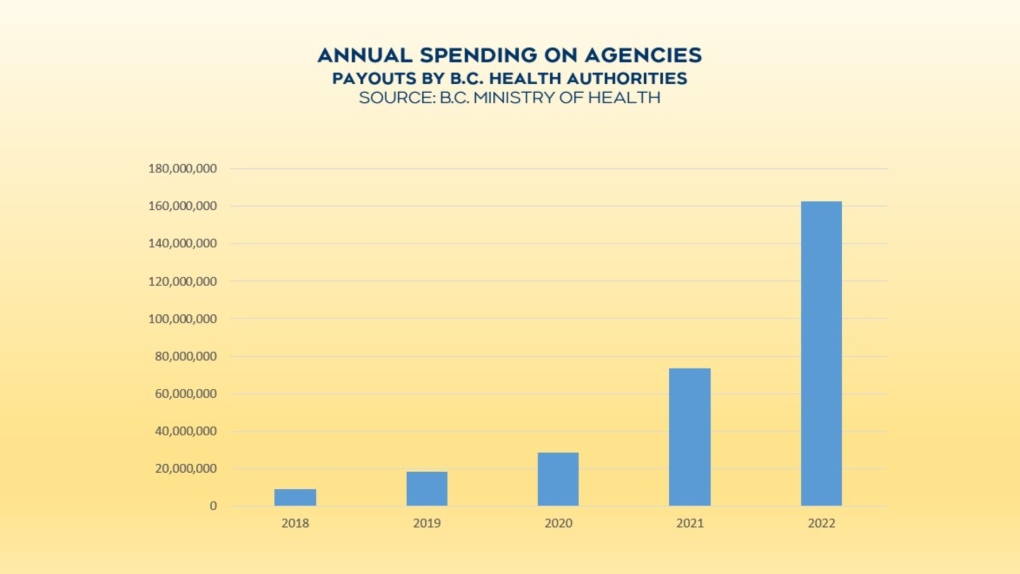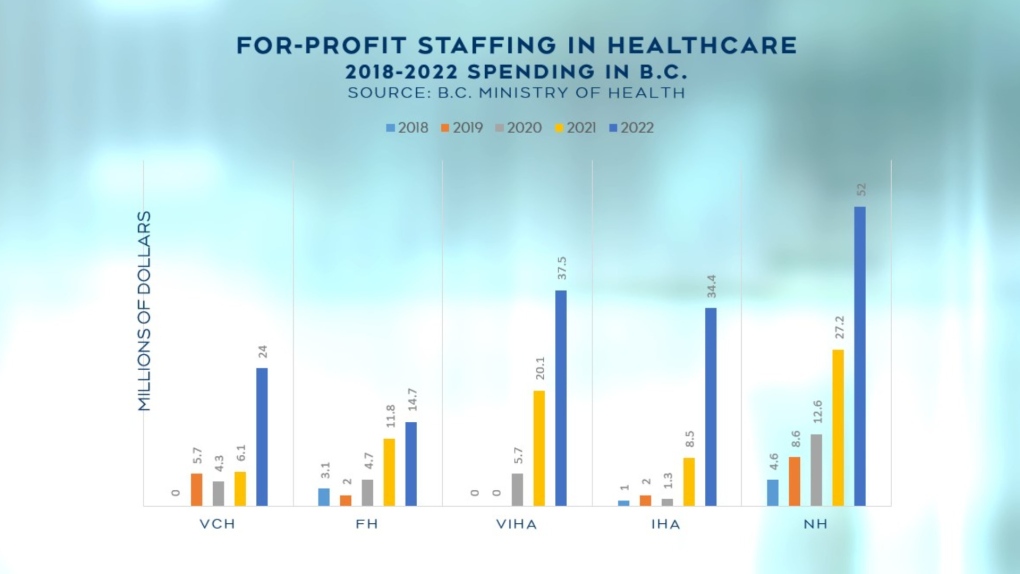Poor use of B.C. taxpayer dollars or necessary health-care expense? Critics slam secrecy and soaring costs
A day after CTV News was first to report British Columbia’s health authorities have more than doubled their payments to for-profit staffing agencies, there’s growing outrage at the taxpayer dollars going to a “parasitic industry.”
After months of follow-up emails and requests, the Ministry of Health finally provided updated numbers outlining how much B.C.’s health authorities paid the agencies to provide nurses in hospitals, care homes, and other public facilities: $163 million in the 2022-23 fiscal year, compared to $76.7 million the year before.
“I think it's quite shameful, honestly, that the Ministry of Health and the health authorities have attempted to hide these details from the public,” said Camille Currie, co-founder of the advocacy group BC Healthcare Matters. “What we're witnessing is a public system that is driving workers into privatization.”
The BC Nurses' Union had anticipated growth in the diversion of public dollars, and is concerned to see the latest figures.
“There are a lot of taxpayer dollars being spent on privatized nursing services and that is taxpayer dollars that could be better spent improving working conditions for nurses and care conditions for patients,” said BCNU president, Adriane Gear.
She also pointed out nurses are frustrated to routinely work with far fewer staff than is safe or required to provide quality care, and that forced overtime, rejected requests for time off, and pressure to work even more hours have pushed many nurses out of the over-burdened public sector.
“Nurses can no longer continue to work in an area where there should be 10 nurses and there's only five, and you can do that for a shift or two, but that has become the norm and nurses are burning out,” Gear said.

Warnings not heeded
Academics, frontline workers, and unions alike had warned the province to reign in their use of the staffing agencies or they’d face a “vicious cycle” of more nurses going to third-party employers that pay hefty wages, travel and hotel expenses, per diems, and let nurses choose their schedules and where they work.
One of them was SFU health policy researcher, Andrew Longhurst, who pointed out the agencies are charging markups of 30 per cent on top of what the nurse makes, describing it as a “parasitic industry” that will weaken the public system. https://bc.ctvnews.ca/b-c-s-health-care-crisis-first-look-at-massive-markups-by-parasitic-staffing-industry-1.6559044
“The more that we continue to rely on them, the more that they overcharge for the basic staffing that we need in our public hospitals, the more that it becomes unsustainable financially to deliver public health care,” he said. “It's highly inefficient, it's extremely costly, it doesn't make any economic sense.”
Health authorities officially muzzled
In the past, the health authorities have reluctantly provided the data and pointed out agency staff were only a small part of their overall nursing budgets, in some cases under one per cent, and have been a vital option for rural and remote communities with staff members wanting vacation time or needing medical leave.

They were also helpful in contact tracing and vaccinations during the pandemic, but as a mass exodus of burnt-out health-care workers shook the system to its foundation, some of those workers went to agencies to obtain a work-life balance while making use of their valuable skill set.
CTV News has heard from senior health authority officials in the past, who insisted costly agency staff are only called in as a last resort when full-time staff are unavailable, but the Ministry of Health has now forbidden them from speaking on the matter.
“Going forward, the Ministry of Health will be providing one provincial response on this topic due to the complexity of data collection,” wrote a spokesperson.
There’s nothing complex about the sharp increases when the numbers are charted, especially in the Vancouver Coastal and Northern Health authorities.
Health Minister Adrian Dix spoke with CTV News before his staff would provide the data, and he said that “agency nursing is not what we want,” but his priority is keeping emergency rooms open.
CTVNews.ca Top Stories

Can the Governor General do what Pierre Poilievre is asking? This expert says no
A historically difficult week for Prime Minister Justin Trudeau and his Liberal government ended with a renewed push from Conservative Leader Pierre Poilievre to topple this government – this time in the form a letter to the Governor General.
'I'm still thinking pinch me': lost puppy reunited with family after five years
After almost five years of searching and never giving up hope, the Tuffin family received the best Christmas gift they could have hoped for: being reunited with their long-lost puppy.
Wrongfully convicted N.B. man has mixed feelings since exoneration
Robert Mailman, 76, was exonerated on Jan. 4 of a 1983 murder for which he and his friend Walter Gillespie served lengthy prison terms.
Two U.S. Navy pilots shot down over Red Sea in apparent 'friendly fire' incident, U.S. military says
Two U.S. Navy pilots were shot down Sunday over the Red Sea in an apparent 'friendly fire' incident, the U.S military said, marking the most serious incident to threaten troops in over a year of America targeting Yemen's Houthi rebels.
BREAKING NEWS 6 adults, 4 children taken to hospital following suspected carbon monoxide exposure in Vanier
The Ottawa Paramedic Service says ten people were taken to hospital, one of them in life-threatening condition, following an incident of suspected carbon monoxide exposure Sunday morning in the neighbourhood of Vanier.
Big splash: Halifax mermaid waves goodbye after 16 years
Halifax's Raina the Mermaid is closing her business after 16 years in the Maritimes.
Second body recovered from site of B.C. landslide
The second resident of a home that was destroyed by a landslide in Lions Bay, B.C., last weekend was found dead Saturday, officials confirmed.
A small plane crashes into a Brazilian town popular with tourists and the number of dead is unclear
A small plane crashed into a Brazilian town that is popular with tourists on Sunday, killing several people, local officials said.
OPP find wanted man by chance in eastern Ontario home, seize $50K worth of drugs
A wanted eastern Ontario man was found with $50,000 worth of drugs and cash on him in a home in Bancroft, Ont. on Friday morning, according to the Ontario Provincial Police (OPP).






























